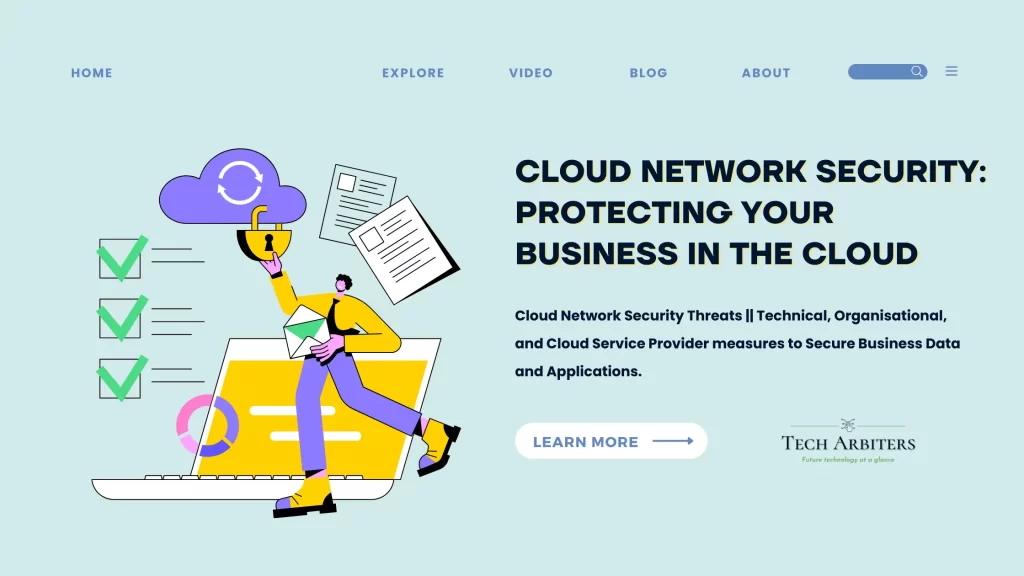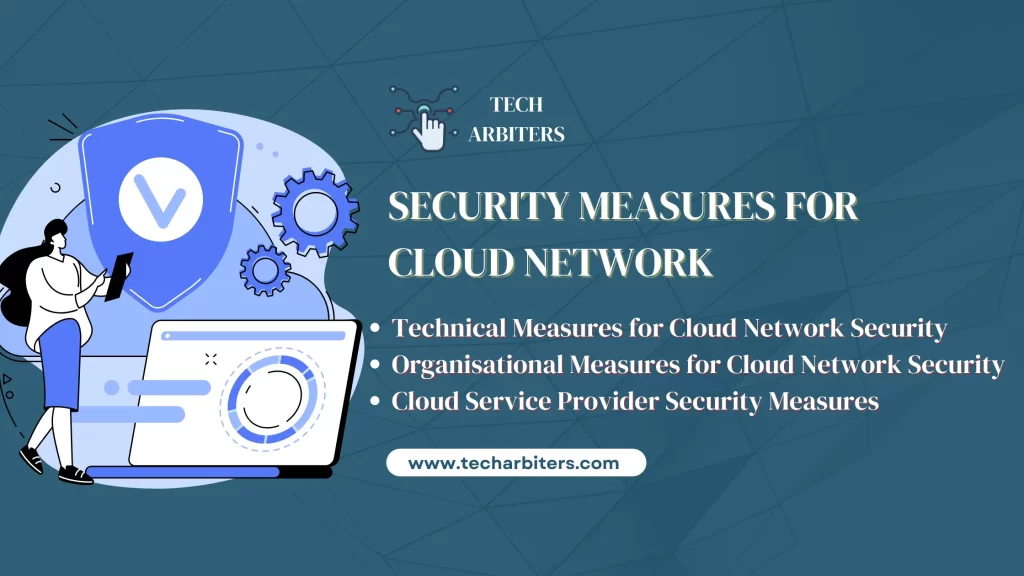As the use of Cloud networks is at its peak so far, Cloud Network Security is a growing concern as more and more businesses move to the cloud. There are several threats that can impact a business when its vital data and applications are stored in the cloud. These threats include Denial of Service Attacks (DOS), Data Breaches, and Malicious insiders.
When it comes to cloud network security, businesses need to be proactive. They need to implement the appropriate measures to protect their data and applications from attack. And need to monitor their systems for signs of an attack continuously.
To deal with these threats, businesses need to implement broad security measures. This includes technical, organisational, and cloud service provider measures. In this article, we will see more about the different measures to protect the cloud network for businesses.

Cloud Network Security Threats
Most businesses today rely on the cloud in some way or another. Cloud-based applications and services offer many advantages, such as flexibility, scalability, and cost savings. Nowadays, as more businesses move to the cloud, security concerns are also growing at the same rate. Cloud and network security become essential when an organisation has unique and precious data.
One of the four roots of cloud computing is distributed computing. This root handles and stores all the data within the organisation. Hence, most of the time, it becomes the target for the security threat and requires cloud-based network security.
Cloud-based data and applications are vulnerable to various threats, including data breaches, denial of service attacks, and malicious insiders.
Data breaches:
Data breaches are a major concern for businesses that store data in the cloud. A data breach can be considered when an unauthorised person gains access to the firm’s sensitive information. This can happen if a hacker gains access to a company’s network or if an employee accidentally exposes data.
Once the data is breached, it can be used to commit fraud or identity theft. A hacker first targets the cloud networking security and gets all the data which can cause a company millions of dollars.
Denial of service attacks (DOS):
Denial of service attacks (DOS) is another threat that can target businesses in the cloud. A DOS attack occurs when a hacker floods a server with traffic, overwhelming it and causing it to crash. This can make a website or application unavailable to users. DOS attacks also use to extort businesses by demanding a ransom to stop the attack.
Malicious Insiders:
Malicious insiders are another threat to businesses in the cloud. Insiders are employees or contractors who have authorised access to company data. However, they may misuse this access for their gain.
For example, they may sell sensitive customer data or delete important files. Malicious insiders can be challenging to detect and prevent because they often have legitimate access to company data. In addition, the company’s insider has all the data about the cloud and network security. Hence, preventing this kind of cloud network security threat becomes difficult.
Here we saw that different kinds of cloud and network security threats could happen in any organisation that uses cloud networks. Many threats are present with cloud network security, but they can also be eliminated or prevented by using the appropriate security measures given below.
💻 Technical Measures for Cloud Network Security

Technical measures are steps that businesses can take to secure their vital data, logs, and applications in the cloud. These measures include things like authorisations, access control, and encryption.
Encryption is a process of transforming data into a code that can only be decrypted by authorised individuals. This helps to protect data if it is intercepted by an unauthorised person. Businesses should encrypt all sensitive data in order to secure it from being stolen.
Access control is another important measure for securing data in the cloud. This involves granting users access to only the data and applications needed for their job. It also consists in setting up proper authentication measures, such as two-factor authentication.
By restricting access and increasing security measures, businesses can help to prevent data breaches. Some of the examples are two-factor security authorisation and biological access control.
🏢 Organisational Measures for Cloud Network Security
Organisational measures are steps that businesses can take to improve their security posture. These measures include things like employee training and security policies.
Employee training is an important organisational measure for cloud security. Employees should be trained on proper security procedures, such as how to handle sensitive data and how to spot potential threats. They should also be aware of the consequences of violating security policies. Educating employees is also an important measure to decrease the data breaches and security threats.
Security policies are another important organisational measure for cloud security. These policies should outline the acceptable use of company data and resources, as well as consequences for violating policy. They should also specify how data should be protected, such as through encryption. By having clear and enforceable security policies, businesses can help to deter potential threats.
☁ Cloud Service Provider Security Measures
Cloud Service Providers (CSPs) are companies that offer cloud-based services, such as storage and computing power. When choosing a CSP, it is crucial to consider its security measures. CSPs should have robust security measures in place to protect customer data. They should also have a security response plan in the event of a security breach.
CSPs should have the following security measures in place:
- Detect malicious attacks: The CSPs should be able to detect certain types of malicious attacks in order to prevent vital data of the organisation.
- Encryption: Data encryption services should be available for organisations.
- User authentication: CSPs should offer multiple layers of user authentication, such as password protection and Two-Factor Authentication (2FA).
- Access control: CSPs should have strict controls in place to limit who can access customer data.
- Incident response plan: In the event of a security breach, CSPs should have a plan in place to quickly and effectively respond.
- Periodic inspection: The CSPs should inspect the Cloud Security Network periodically from both the organisation and service provider.
Note: When considering a Cloud Service Provider, businesses should ask about its security measures. They should also review the CSP’s security policies and procedures. By doing this, companies can help to ensure that their data is safe in the hands of the CSP.
Some of the world’s top Cloud Service Providers are Amazon Web Services (AWS), Google Cloud Platform (GCP), Microsoft Azure, and Alibaba Cloud.
The Future of Network Security is in the Cloud
As we can see, cloud network security has become essential for businesses, and the demand will increase in the future. Cloud networking security threats are also growing noticeably.
Cloud network security is a fundamental concern for any business moving to or using cloud services. CNS starts with understanding the risks and taking measures to mitigate them. There are many benefits to be gained from the Cloud, but these come with increased risks which must be managed.
Businesses should always consider the security measures of a Cloud Security Provider before choosing one. By doing so, they can help to ensure that their data is safe and secure in the Cloud.
Cloud Service Providers (CSPs) are responsible to their customers for ensuring the security of their data and systems, but businesses must also take steps to protect themselves.
In this article, we saw many security measures before securing the business data. However, in the future, there will be more options available as technology evolves at a higher rate.
Artificial Intelligence (AI) will be one of the options in the future of Network Security in the Cloud. AI has the potential to automate the process in order to secure all the business data according to programming and instruction. Involving more machines in the security process may also decrease the rate of errors.
Blockchain Technology is another option in the future of Network Security in the Cloud. Blockchain technology is one of the most secure technologies for decentralised data transfer. This can provide more flexibility and reliability for the cloud network security.
Conclusion:
In nutshell, Cloud Network Security is an important aspect of any organisation that uses cloud networks to run a business. To secure the digital data, a company must follow various security measures as we discussed earlier.
In the future, Cloud Network Security Threats may remain a headache for the business owner. However, the cloud service providers are actively finding a way to deal with security threats.
It is always essential to prevent the data before any unauthorised person trying to get access to that data and using it in an inappropriate way. Share your point of view below in the leave a replay section.

Hybrid cloud networks are flexible and agile. The network can handle surges in computing demand, all you need to do is to scale up your on-site infrastructure to a public cloud. A hybrid cloud network offers scalability and security. Although it is far from perfect, its cost-efficiency makes it a good option for businesses. The right resources and expertise can help you deploy a hybrid cloud network which can open up many new opportunities for business potential and agility.